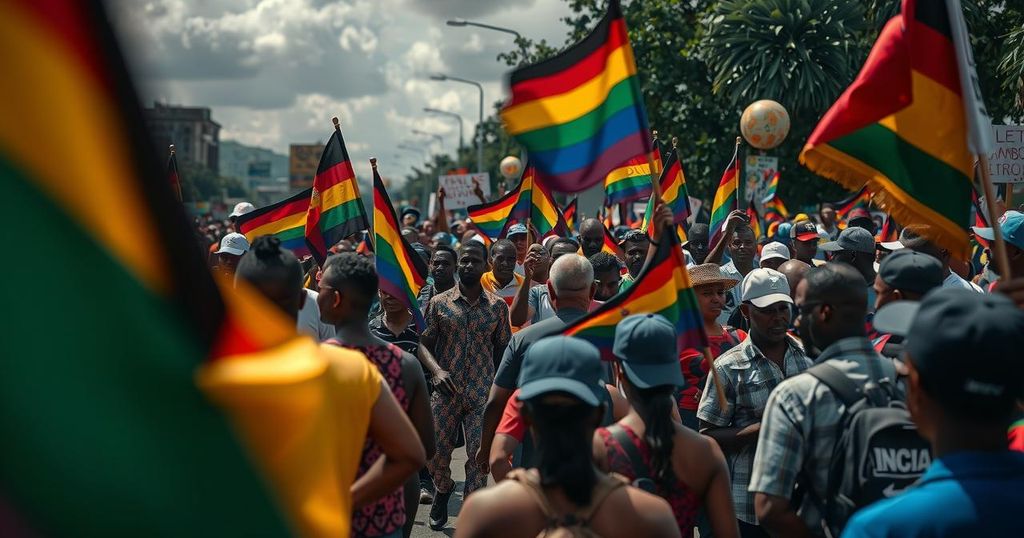Protests erupted in Mozambique following the controversial election results that confirmed the ruling Frelimo party’s hold on power, leading to at least 11 fatalities from police violence and significant injuries among protesters. Allegations of electoral fraud have intensified calls for justice and political reform, particularly among the nation’s youth, as they rally behind opposition leader Venâncio Mondlane of Podemos. Historical contexts of violence against dissenters only exacerbate the current crisis.
On October 25, in Maputo, Mozambique, Silvio Jeremias was fatally shot while returning home from work, amidst widespread protests regarding the disputed election results. Official results revealed that Daniel Chapo, the candidate of the ruling Frelimo party, received 70.7% of the vote, thereby maintaining the party’s long-standing hold on power since the country’s independence in 1975. However, numerous allegations of election fraud have emerged, prompting nationwide demonstrations. Reports indicate at least 11 individuals have lost their lives due to the actions of security forces during these protests, with approximately 50 others sustaining serious injuries from gunfire, as documented by Human Rights Watch. Police officials claimed that live ammunition was only discharged into the air to disperse demonstrators, while a police spokesperson stated the tragic death of a woman and several injuries were due to ‘stray bullets’ amid confrontations between police and opposition supporters from the Podemos party. Mozambique, characterized by a predominantly young populace (the average age being under 18), is witnessing growing discontent directed at Frelimo’s nearly five-decade rule. The principal opposition, Podemos, led by Venâncio Mondlane, asserts the party won 53% of the electoral vote and has initiated a legal challenge supported by substantial documentation. Despite this, the official commission reported that Frelimo augmented its parliamentary representation to 195 seats out of 250, leaving Podemos with 31. Pre-election accusations surfaced, with civil society organizations alleging Frelimo inflated voter registration rolls with nearly 900,000 fictitious identities. Additionally, credible witness statements included allegations of ballot manipulation and discrepancies during result tallies as noted by EU election monitors. As protests escalated, the violence also claimed the lives of political figures, such as lawyer Elvino Dias and filmmaker Paulo Guambe, further highlighting a troubling trend of violence against opposition members and activists historically taking place in Mozambique. In a related incident, gunfire was aimed at Mondlane during a press conference, increasing the atmosphere of tension and danger surrounding the opposition leaders. In mourning for Jeremias, friends and family gathered, denouncing the violence while advocating for justice and democratic reforms. Demonstrators were seen expressing their pleas for the preservation of democracy, with poignant messages displayed during grieving rituals.
The political landscape in Mozambique has been dominated by the Frelimo party since its independence in 1975. Recent elections have led to significant unrest, as allegations of electoral fraud have surfaced, raising concerns about the integrity of the democratic process in one of the world’s poorest nations. The youth-driven disillusionment with Frelimo’s long-standing governance is evident, particularly in light of the blatant disparities reported between official election results and claims made by opposition groups. The recent turn of events, including violent protests and increasing casualties, reflects the deep-rooted discontent lingering in the populace, particularly among the younger demographic seeking change. Civil society and international observers have raised serious concerns over electoral fairness, bringing to light historical instances of violence against opposition figures, further complicating the quest for justice and democratic accountability in Mozambique.
The tragic events surrounding the recent protests in Mozambique expose the critical and precarious state of the nation’s democracy, characterized by a longstanding rule by Frelimo and allegations of electoral misconduct. The loss of Silvio Jeremias among other protesters underlines a growing cry for justice amid rising political tensions. With opposition groups mobilizing against alleged electoral fraud and a populace calling for accountability, the situation remains fluid and requires urgent attention to uphold democratic values and human rights within the country.
Original Source: www.theguardian.com






